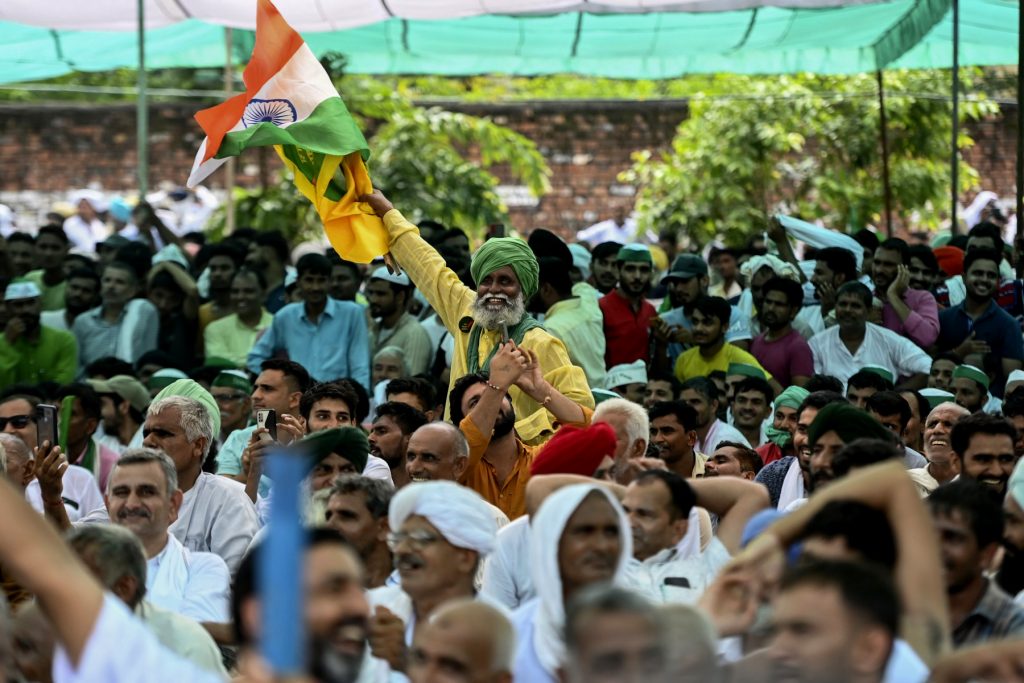Catholic Church leaders in India welcomed the decision of the country’s farmers to formally end year-long mass protests last week after Prime Minister Narendra Modi abandoned his push for agricultural reforms, defusing one of the biggest challenges faced by his government.
“It is a big victory for the farmers, whatever may be the political compulsions for Prime Minister Modi,” said Father Anand Mathew, a member of the Indian Missionary Society who led Catholic priests and nuns in a march early this year to show solidarity with the farmers.
A report in Matters India quoted the priest saying that “the farmers’ victory is an inspiration and tremendous encouragement for those of us who are on the path of Satyagraha.”
Father Mathew lauded that farmers for their “courage, dedication and patience,” said the report, adding that the protest showed the determination of the farmers to carry on “with a strong faith in non-violence.”
Sister Dorothy Fernandes of the Sisters of the Presentation of the Blessed Virgin Mary congregation said the protests have sent a “clear message of what is possible if we are united in purpose and not afraid to pay the price.”
She described the farmers’ demonstration as “the longest and greatest historical protest in the entire world,” adding that the farmers succeeded “because of their clarity of thought and meticulous organization of people and resources.”
Heading home
Thousands of Indian farmers packed their belongings and dismantled tent cities on the outskirts of Delhi on Saturday, December 11, as they headed home following a year-long protest against the government’s agriculture policies.
In a rare retreat last month, Prime Minister Modi announced and pushed through parliament the repeal of three contentious laws that farmers claimed would let private companies control the country’s agriculture sector.
Hundreds of farmers danced and celebrated the victory early Saturday as they began removing roadblocks and dismantling thousands of makeshift homes along major highways.
They lit firecrackers, hugged each other and distributed sweets as blaring loudspeakers played patriotic and revolutionary songs dedicated to the agitation.
At Singhu, one of the protest sites, long queues of lorries and tractors packed the highway heading north into their home states of Haryana and Punjab.
Farmers in India have political heft due to their sheer numbers — tens of thousands had camped out since November 2020 to protest against the laws in the biggest challenge to the Modi government since it came to power in 2014.
“We were determined to protest as long as it had taken. But all of us are happy that the government accepted our demands and we are going back to our homes,” Sativinder Singh, one of the Singhu protesters, told AFP.
“It is a big day for the farmers as we can peacefully go back to our homes,” he said.

Legal guarantees
Protesters had initially refused to leave the sites despite the repeal of the legislation, pressing other demands including a legal guarantee for minimum benchmark rates for their produce.
Some Indian states and central government set minimum prices for crops every year but farmers have long demanded a law to ensure income stability.
The government said it will form a commission on fixing minimum crop prices and promised to stop prosecuting farmers for burning stubble that is blamed for polluting Delhi’s air every winter.
It also agreed to pay compensation to the families of more than 700 farmers who died during the demonstrations and withdraw criminal cases lodged against protesters during the year-long campaign.
The three agricultural laws passed in September 2020 aimed to deregulate farm produce markets from state control and allow private companies to enter the sector — on which two-thirds of India’s more than 1.3 billion population rely for a living.
The government said the laws were a necessary reform but farmers opposed the move, saying it would leave them at the mercy of big corporations.
“Government should now ensure that they fulfil the promises made to us,” Baljot Bawja, a protester at Ghazipur, told AFP.
“We don’t intend to come back but if government goes back on its promises, we will be compelled to launch another protest,” he said.
Farmers started local protests in Punjab and Haryana — India’s breadbasket states — before tens of thousands headed to New Delhi to press their demands.
But they were violently stopped by police at the borders of New Delhi, triggering a year-long impasse that saw authorities erect concrete and steel barricades and metal spikes to stop their advance.
The protests remained largely peaceful, with occasional bouts of violence, including during a tractor rally in January on Indian Republic Day.
Modi’s governing Bharatiya Janata Party is campaigning in five states, including political bellwether Uttar Pradesh, for elections early next year.
Analysts say Modi’s retreat on the laws came over fears growing discontent among large sections of the rural population and the stalemate at the Delhi borders were hurting its electoral prospectus. – with reports from Matters India and Agence France Presse